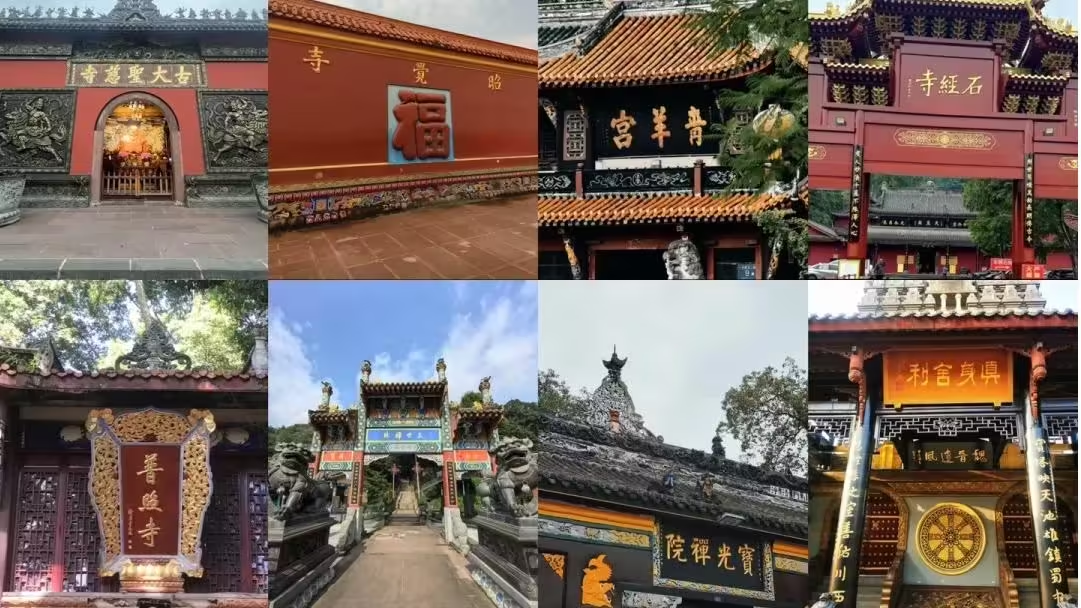Chengdu, the capital of Sichuan Province, is not only famous for its spicy cuisine and bustling streets but also for its rich tapestry of temples that offer a serene escape from the city’s hustle and bustle. These temples, steeped in history and spirituality, provide visitors with a glimpse into the region’s cultural heritage and religious practices. In this guide, we’ll explore some of the most notable temples in Chengdu, each with its unique charm and offerings. From tranquil Zen gardens to exquisite architecture, these spiritual sanctuaries are perfect for meditation, reflection, or simply enjoying a peaceful day surrounded by nature.
Top 8 Temples in Chengdu
1. Wenshu Monastery (文殊院)
Established during the Sui Dynasty, Wenshu Monastery is a serene oasis amidst the city’s hustle. The temple features a beautiful vegetarian restaurant known for its diverse menu, including delicious dishes and traditional Song-style tea ceremonies. Don’t miss the opportunity to try the popular Yantaipo Guokui (严太婆锅盔) and royal pastries (宫廷糕点) while you’re here.
- Admission Fee: Free
- Hours: 8:00 AM – 5:00 PM
- Transportation: Take Metro Line 1 and exit at Wenshu Monastery Station (文殊院站) (K exit).
2. Zhaojue Temple (昭觉寺)
Revered as the “First Zen Forest in Western Sichuan,” Zhaojue Temple is surrounded by stunning ginkgo trees and ancient architecture, making it a picturesque spot for photography. After visiting the temple, you can conveniently head to the nearby zoo for some family-friendly fun.
- Admission Fee: Free
- Hours: 8:00 AM – 5:00 PM
- Transportation: Take Metro Line 3 and exit at Zhaojue Temple South Road (昭觉寺南路站) (A exit).
3. Baoguang Temple (宝光寺)
Located in Xindu, Baoguang Temple is a thousand-year-old temple built during the Sui Dynasty and is one of the “Four Great Buddhist Monasteries.” The temple features numerous Arhat statues, and visitors can receive an Arhat card by memorizing the corresponding numbers. The vegetarian meals here are quite delicious as well.
- Admission Fee: 5 RMB
- Hours: 8:00 AM – 5:00 PM
- Transportation: Take Metro Line 3 to Zhonglou Station (钟楼站) and transfer to a bus.
4. Daci Temple (大慈寺)
Dating back to the Wei and Jin Dynasties, Daci Temple is known as the “First Monastery of Zhendang” and is conveniently located next to Taikoo Li shopping area. The temple serves vegetarian meals starting at 11:30 AM, and visitors can also enjoy traditional tea and opera performances nearby.
- Admission Fee: Free
- Hours: 8:00 AM – 5:30 PM
- Transportation: Take Metro Lines 2 or 3 and exit at Chunxi Road (春熙路站) (C exit).
5. Shijing Temple (石经寺)
Founded at the end of the Eastern Han Dynasty, Shijing Temple is famous for its stone-carved Diamond Sutra. The temple grounds are adorned with ancient cypress trees, and the architecture is magnificent. It’s an excellent place for a weekend hike.
- Admission Fee: Free
- Hours: 7:00 AM – 6:00 PM
- Transportation: Take Metro Line 2 to Longquan Station (龙泉站), then transfer to bus 870 or 882C for direct access.
6. Baiyun Temple (白云寺)
Nestled among mountains and near water, Baiyun Temple was built during the Ming Dynasty. Atop the mountain stands an impressive 9.9-meter-high statue of Buddha, offering breathtaking views. Visitors can also explore nearby Taiping Ancient Town and Laojun Mountain.
- Admission Fee: Free
- Hours: 9:00 AM – 5:00 PM
- Transportation: Take Metro Line 10 to Huayuanzhen Station (花源镇站) (D exit) and walk for 10 minutes.
7. Yingtian Temple (应天寺)
Though small, Yingtian Temple is tranquil and perfect for solo visits. Here, you can enjoy vegetarian meals and tea, and when the sun shines, the ancient trees and buildings provide beautiful photo opportunities.
- Admission Fee: Free
- Hours: 7:00 AM – 6:00 PM
- Transportation: Take Metro Line 10 to Yingtian Temple Station (应天寺站) and walk for 5 minutes.
8. Qingyang Palace (青羊宫)
Known as the “First Taoist Temple in Western Sichuan,” Qingyang Palace was founded during the Zhou Dynasty and was originally called Qingyang Si. The temple features significant structures like the Mountain Gate, Sanqing Hall, and Tang Wang Hall.
- Admission Fee: 5 RMB for students, 10 RMB for adults
- Hours: 8:00 AM – 6:00 PM
- Transportation: Take Metro Line 5 to Qingyang Palace Station (青羊宫站) (B exit).
Temple Etiquette Tips
- When purchasing incense at the temple, it’s referred to as “requesting incense” (请香), not buying.
- Dress modestly and neatly before entering the temple.
- You don’t need to stand in the center to worship; sincere prayer is what matters.
- When bowing in prayer, do so slowly, and rise slowly afterward.
- Avoid walking in front of someone who is worshiping.
- Do not photograph the Buddha statues, step on thresholds, or touch the Buddha images.

